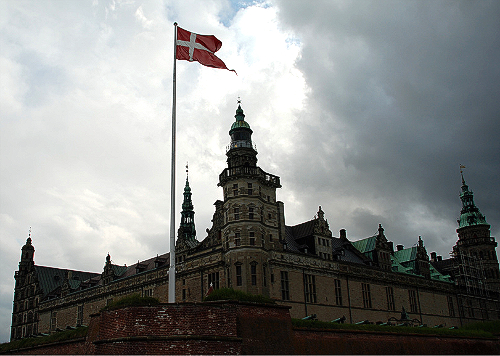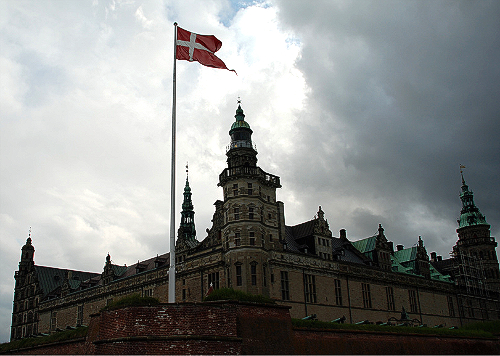Forty-seven kilometers up the coast from Copenhagen, at the narrowest passage between Denmark and Sweden, the 435-year-old Kronborg Castle stands as one of the most magnificent structures in a country that does not lack for stunning architecture. It was the setting where Shakespeare imagined his Hamlet, the clash of rivalries among aristocrats that ends in bloody disarray.
 Shakespeare imagined the Kronborg Castle as the setting for his tragedy, Hamlet. How fitting, then, that CEOs gathered here on Saturday night seemed mostly interested in painless sustainability.Casper Moller via FlickrOn Saturday night Kronborg was the setting for a modern-day royal court, a collection of CEOs and senior executives for several hundred international companies, gathered in the castle’s dance hall for a summit entitled “To Be, or Not to Be? New Leadership for a Sustainable Economy.”
Shakespeare imagined the Kronborg Castle as the setting for his tragedy, Hamlet. How fitting, then, that CEOs gathered here on Saturday night seemed mostly interested in painless sustainability.Casper Moller via FlickrOn Saturday night Kronborg was the setting for a modern-day royal court, a collection of CEOs and senior executives for several hundred international companies, gathered in the castle’s dance hall for a summit entitled “To Be, or Not to Be? New Leadership for a Sustainable Economy.”
Danish media titan Erik Rasmussen organized the event, with the help of Australian writer/explorer/activist Tim Flannery and others. The idea was to get business leaders talking about how they might lead the world to a low-carbon economy. The setting and theme were meant to remind attendees of the existential import of their task—for many of the world’s people, climate change is a life-and-death issue.
I’m not sure the executives absorbed the full weight of Hamlet’s question. From the 15 or so executives who spoke, there was a lot of defending of previous records, a lot of “we’re ready to act once government acts.” Coca-Cola CEO Muhtar Kent spoke about a pledge to remove hydrofluorocarbon, a potent greenhouse gas, from the company’s new vending machines by 2015. But few of the other CEOs’ promises were so concrete.
 Joyce D’Silva of Compassion in World Farming tried to shift the perspective by asking Tracy R. Wolstencroft, global head of environmental markets for Goldman Sachs, how his message would change if the castle were filled with some of “the one billion people who go to bed hungry each night.”
Joyce D’Silva of Compassion in World Farming tried to shift the perspective by asking Tracy R. Wolstencroft, global head of environmental markets for Goldman Sachs, how his message would change if the castle were filled with some of “the one billion people who go to bed hungry each night.”
“Share the Goldman Sachs bonuses,” someone shouted, a line that drew only a few cheers from this crowd.
Wolstencroft’s answer was that the interconnectedness that allowed irresponsible Wall Street bankers to rattle the entire world economy also has a plus side: it’s capable of delivering capital and clean-energy advances to the developing world. In our wired global village, “that innovation, that technology, is highly exportable,” he said.
That was the only talk about poverty for the night. But that’s not the discouraging part. This is: One of the moderators, CNBC anchor Louisa Bojeson, asked the crowd to raise their hands if they were willing to pay 10 percent more for their home’s electricity if it came from a carbon-free source. Two thirds of them, give or take, raised a hand. Would they pay 20 percent more? Fewer than half kept a hand raised. Would they pay 50 percent more? All but a minority, perhaps ten percent, dropped their hands.
These are the royalty of our age — well-compensated, well-heeled corporate leaders, the owners of at least some of the private jets that landed in Copenhagen last week. Home electricity bills, even for mansions, constitute a minuscule portion of their salaries. If they’re not willing to voluntarily pay more for the common good…
There are a number of conclusions you might draw. Maybe the business leaders were defending the right of consumers to choose the lowest price in a free market. Maybe they don’t like raising their hands. Maybe this shows clean-energy choices must be economically appealing—green has to be cheaper than brown if it’s going to catch on. Maybe it means leadership must come from politicians, or social movements. It wasn’t an encouraging moment.
I’m raking my brain for a way to end this post, even pulling a copy of Hamlet out of my suitcase. The line that catches me, the line that always catches me, is the noblewoman Ophelia’s hopeful cry, “We know what we are, but know not what we may be.”
Spread the news on what the føck is going on in Copenhagen with friends via email, Facebook, Twitter, or smoke signals.




